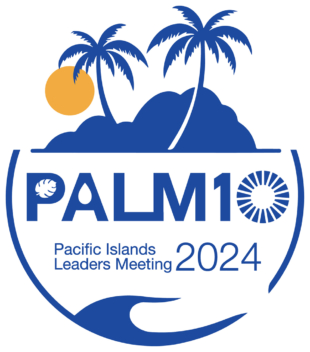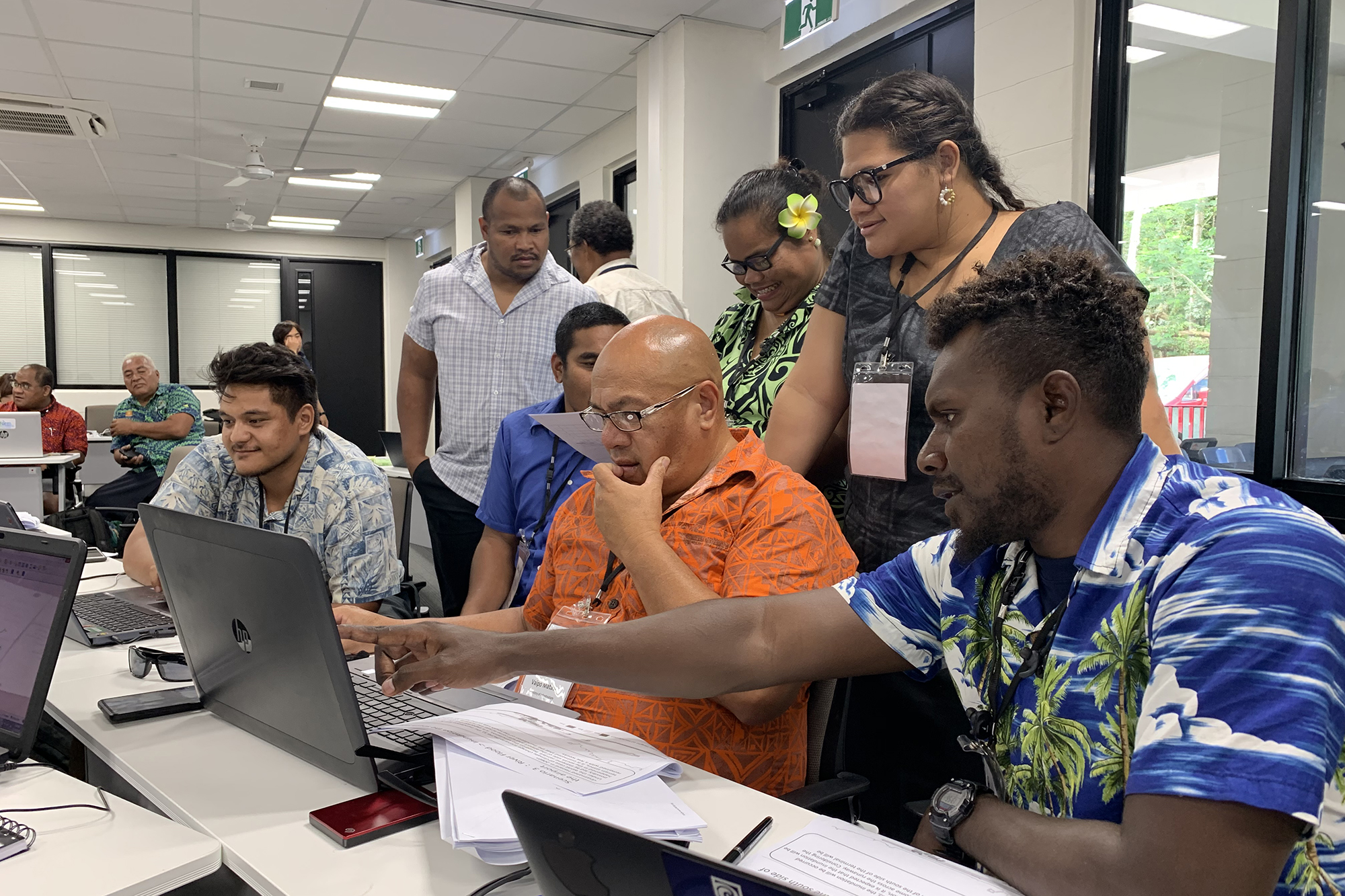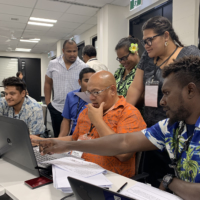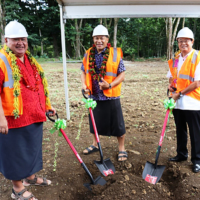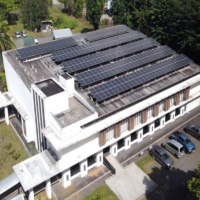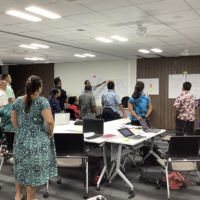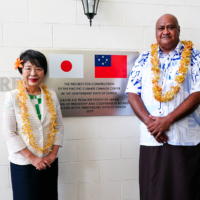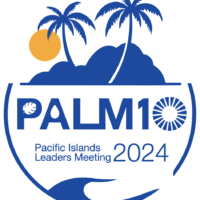The Pacific islands cover nearly a fifth of the Earth’s surface, and Japan and the greater international community depend on these territories, primarily because of their shipping routes and commercial fishing.
These nations are also on the front line of climate change and they need significant support to weather its effects. An island nation itself, Japan has been providing funding, expertise and more for decades to make them more climate-resilient, including by creating and running the Pacific Islands Leaders Meeting every three years since 1997 to discuss regional issues and strengthen its ties with these countries.
Mutual interests
As climate change and marine pollution continue to stir concern as global problems, the Pacific island countries have taken on greater prominence. Fiji hosted the 23rd U.N. Climate Change Conference in 2017, for example, and Papua New Guinea hosted the 2018 Asia-Pacific Economic Cooperation Economic Leaders’ Meeting.
PALM reinforces their ties in matters like these and much more. At the virtual PALM 9 event in 2021, for example, leaders expressed their commitment to working together on five priority areas for the next three years: COVID-19 response and recovery, sustainable oceans based on the rule of law, climate change and disaster resilience, strengthening the foundation for sustainable and resilient economic development, and people-to-people exchanges and human resource development.
A hub for cooperation
Japan’s contributions are often directed through the Japan International Cooperation Agency. Masato Kawanishi, a senior JICA adviser since 2005, has been involved in official development assistance projects addressing climate change in Indonesia, and most recently in the preparation and evaluation stages of two JICA projects, including the new Project for Innovative Solutions for Pacific Climate Change Resilience with the Pacific Climate Change Centre in Apia, Samoa.
“Our cooperation in the region through the PCCC is mainly a grant aid project for the construction of the PCCC and two technical assistance projects,” Kawanishi said. “These were developed as a set, with the Japanese government signing an agreement to build the PCCC in 2016.”
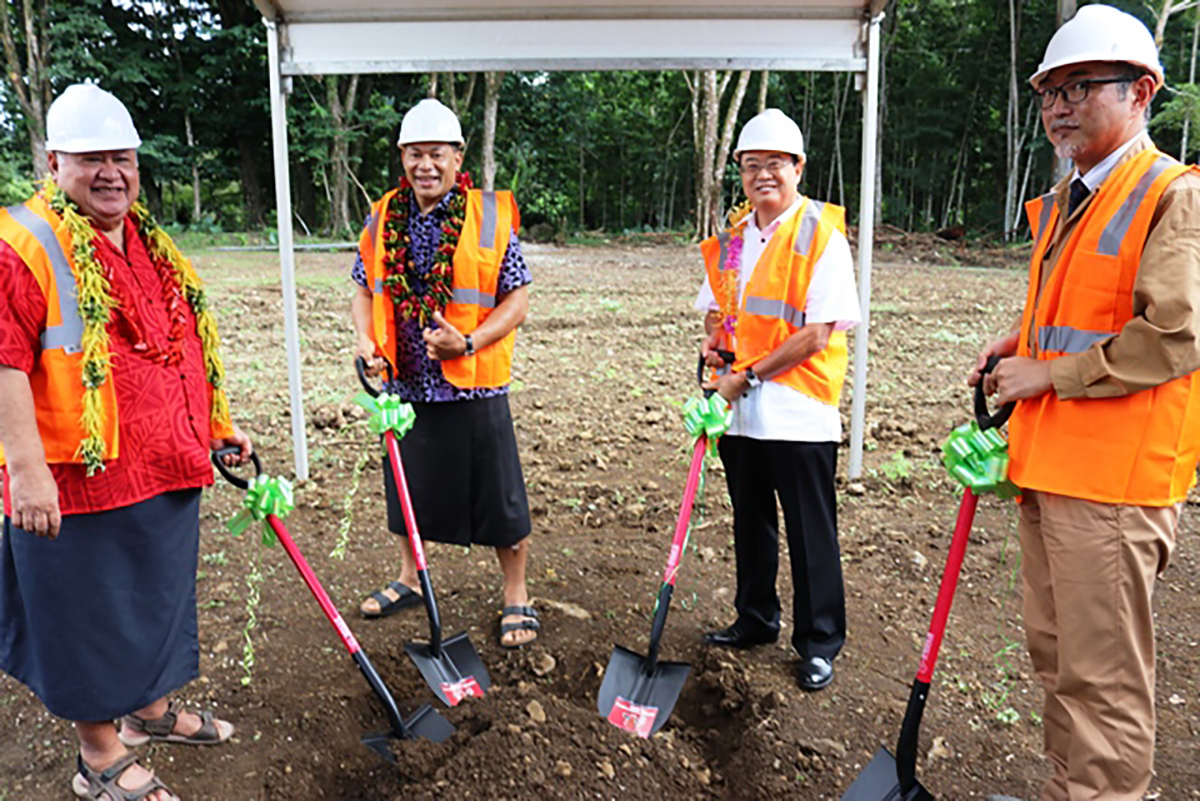
Officially established in 2019, the PCCC was created to become a center of excellence for brokering knowledge, research, innovation and capacity building and training on climate change, according to Kawanishi.
“Spurred by the Japanese government’s actions, New Zealand, Australia and Ireland continue to support the PCCC, which has become a platform for development partner activities in the region,” Kawanishi continued.
The manager of the PCCC ‘Ofa Ma’asi-Kaisamy explained that her role is to guide the center’s strategic direction and operational delivery, leading a staff of seven, joined by two JICA personnel.
“I also take the lead on networking, partnerships and collaboration, ensuring that we engage effectively with our member countries as well as our partners and donors,” she added. An international environmental lawyer from the Kingdom of Tonga, Kaisamy also has an academic background in ocean law and policy, as well as extensive experience in law, project management and climate change resilience.
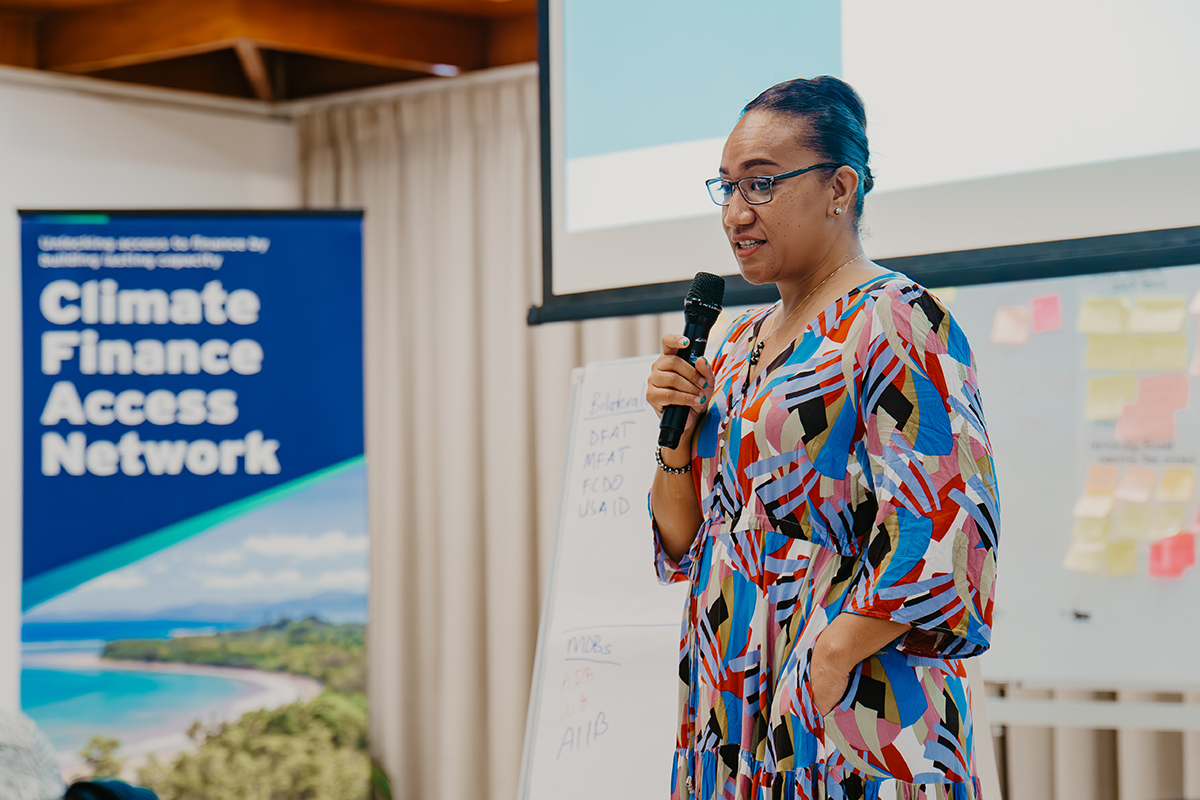
The center is hosted at the Secretariat of the Pacific Regional Environment Programme, a regional organization also based in Apia. Kaisamy guides the PCCC’s work in line with the 2050 Strategy for the Blue Pacific Continent and SPREP’s overarching strategic plan, which ties into the vision and work of the center.
The PCCC was founded in 2019 and became operational in 2020. According to Kaisamy, partnership, networking and collaboration are all crucial to ensuring the center effectively delivers on its mandates and key functions.
Through initiatives like capacity building and its knowledge brokerage, the center has improved local resilience to climate change. As an information and training hub on climate change, it offers proven training and creates and runs training courses geared for the Pacific.
“We translate scientific information in the field of climate change into language that allows our decision-makers to make informed policy decisions. We have coordinated regional workshops for our countries in the Pacific and convened national workshops for Samoa, the Solomon Islands, Republic of the Marshall Islands, Tonga and others. Another core element of the center’s work is to promote training and learning, by coordinating, supporting and delivering capacity building and climate change training to our member nations and the public.”
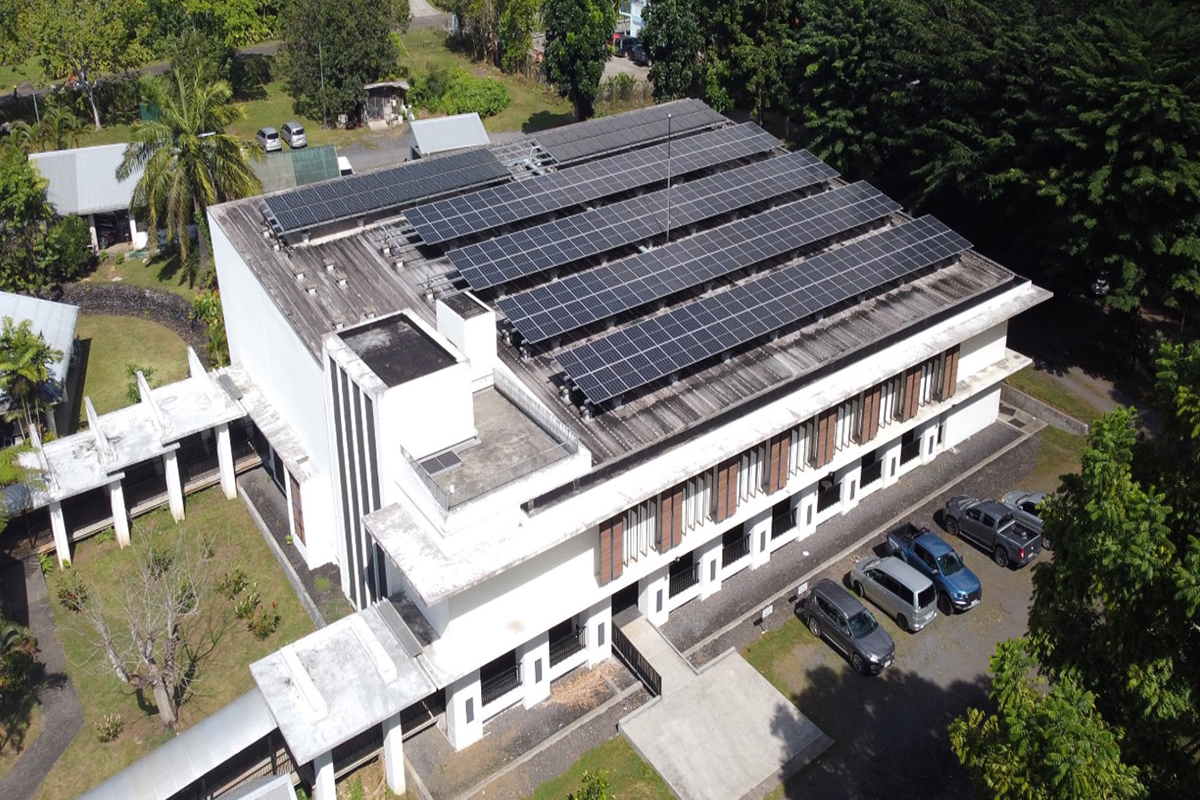
Kaisamy said the center’s greatest accomplishment to date is the physical building, the PCCC they work in.
“It’s a 100% solar-powered building showcasing leadership, attainable ambitions and sustainable building technology in the Pacific. This also demonstrates that through small steps locally, everyone can collectively and collaboratively cut greenhouse gas emissions by a significant amount in our region. This initiative is aligned to the vision of the PCCC as a center of excellence for our Pacific peoples, for climate change information, for science to services and applied research, for capacity building and knowledge brokerage.” Japan, she added, was responsible for underwriting 20% of the solar panels for the 100-kilowatt rooftop solar system, while the remaining 80% was funded through the Irish Aid Fund.
Expert advice and counsel
JICA Magazine reports that training is key to addressing climate change. When the PCCC opened its doors in July 2019, JICA launched the Project for Capacity Building on Climate Resilience in the Pacific to establish a training capability within the PCCC and ensure that practitioners can address climate change issues through such programs.
“That project focused on human resource training centered around three pillars: climate change adaptation, climate change mitigation and access to climate finance,” Kawanishi explained.
Through this project — which develops the skills, instincts, abilities, processes and resources that organizations and communities need to survive, adapt and thrive in a fast-changing world — about 520 people from the region, including personnel from governmental and nongovernmental organizations and the private sector, were trained, with 369 receiving certificates for completion.
According to Kaisamy, Papua New Guinea has adapted concept notes and results from the capacity-building course to strengthen climate resilience and access to safe water in rural areas. The government of Tonga is now using them to formulate a proposal for transforming tourism into climate action initiatives.
The JICA training program also spurred initiatives from other countries.
“After we delivered a training course on health and climate change in 2022 in partnership with the University of Melbourne, they approached us again in 2023 asking whether we were interested in partnering to put together an application for the Australia Awards Fellowship program on climate, health and equity funded by the Australian government. We identified 15 fellows from the Pacific for the program from that cohort that have been trained under the Capacity Building on Climate Resilience in the Pacific program.” Their training over six weeks at the University of Melbourne really improved the resilience of Pacific communities, and the Australia Awards Fellowship program served as an example of an effective model for regional capacity building on critical issues of importance for regional stability, Kaisamy said.
Kawanishi said the PCCC discusses the content of the training, the curriculum, the teaching materials and so on with Japanese experts.
“On the Japanese side, we are in a position to partner with the PCCC in their implementation. The center staff are very motivated, proactive and full of enthusiasm, making them a very encouraging partner,” he said.
As for other stakeholders, he mentions that universities, such as the University of the South Pacific in Fiji, got involved by providing lecturers. Local NGOs provided core lecturers and collaboration with other parties is expected.
“In that sense, cooperation with various actors — not just local government agencies — took place during the project,” Kawanishi noted.
Implementing the capacity-building project was not without its difficulties, Kawanishi added.
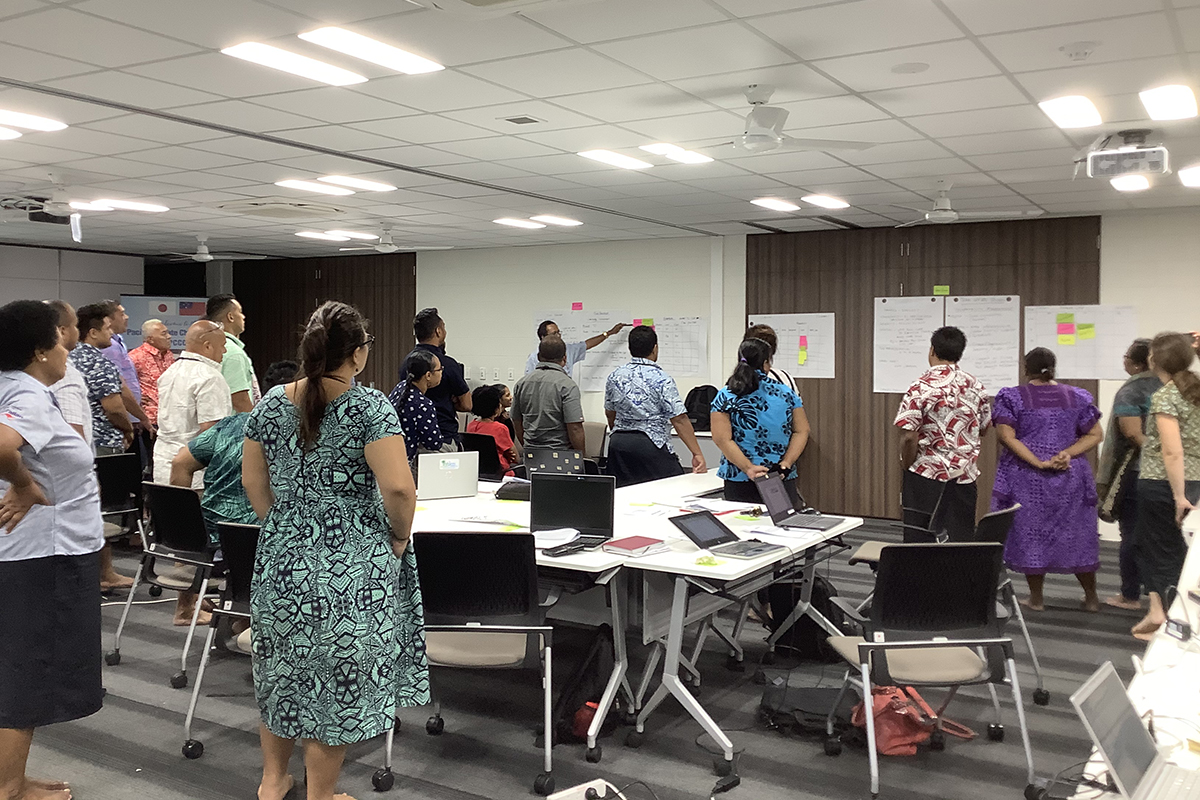
“It was originally intended to be a face-to-face training program, but COVID-19’s impact meant that such training could no longer be conducted. To address this situation, we proceeded to develop online programs, and ultimately managed to put together a full range of online training programs and materials,” he said, adding that it also laid the foundation for the PCCC to continue offering its own training to related countries even after the project ended.
The center’s e-learning platform is one example of innovation.
“It has four key categories: executive courses, webinars, a category for students and young children, and open learning, which anyone can take. We worked with 12 partners to deliver those courses, from U.N. agencies to universities, and experts that are working in government,” Kaisamy said.
Completed in January 2023, the capacity-building project received high praise from the trainees. Theresa Wombon-Kambuy, who works for the Department of Agriculture and Livestock in Papua New Guinea, attended the center’s virtual workshop on climate resilience and food production systems. “The lessons learned during the workshop were that critical thinking was needed to find the problems and causes, and how these causes can become objectives of project implementation. The lessons learned from this program have really helped us,” she said.
Facilitating innovation
A new JICA initiative called the Project for Innovative Solutions for Pacific Climate Change Resilience started in March. According to Kawanishi, this project focuses on finding different ways for the region to adapt while enhancing its knowledge brokerage and capacity-building functions as the first project did.
“While the previous project aimed to establish the foundations for training, this time the aim is to achieve more visible results at the action and field level,” he said.
Specifically, as part of this project, the PCCC will select supporting organizations for public-private partnership promotions, provide consulting and mentoring services and visit recipient countries in person to encourage the execution of tangible initiatives.
When deciding on the content of the project, Japan listened closely to the PCCC’s requests.
“The new project involves cooperation that places great emphasis on innovation. This was something they strongly requested,” Kawanishi explained.
Expectations from the PCCC are therefore very high, with Kaisamy noting that it is critical for this new project to add value and to catalyze the center’s innovation functions so that effective solutions can be brought to those facing challenges. The PCCC has thus drafted a proposal to submit to the Japanese government to promote innovation, as defined in its strategy and business plan, by focusing on the private sector and opportunities for public-private partnerships.
“The private sector is the critical driver of change in the Pacific, especially in contributing to national climate change adaptation and mitigation goals.” Kaisamy noted. “Greater involvement by local private-sector entities in key climate initiatives is necessary to ensure the robust and successful implementation of national policy goals. Strengthening the public-private sector partnership as well as the relationships between private-sector companies would benefit all parties.”
In this regard, Kawanishi emphasized that it is important to pursue a win-win approach to addressing climate change. Since the market size of the Pacific islands is typically smaller than other regions, pursuing synergies with development is key.
“We have also trained whale-watching operators on tourism and climate change and building resilience in the previous project on capacity building with JICA, and we are now looking into engagement with hotels, training them to devise solutions that the communities can use,” Kaisamy explained.
What comes next
Kaisamy outlined three future initiatives the center intends to focus on: establishing a climate finance investment hub, creating an innovation lounge and building its human and technical resources capacity.
“Our innovative climate investment hub will deliver long-term investment toward a programmatic approach to addressing climate change for our countries,” Kaisamy said, “and is something that our partners can invest in and will be managed by the center. That is the big-ticket item for us.”
She also reflected on the PCCC’s innovation lounge, now under development, which will showcase and market climate change solutions “like that shopping website, Alibaba. A platform that countries can access and say, ‘I want to meet this solution’s developer.’ The lounge will make that connection between our countries and developers.”
The center is also partnering with organizations such as the Climate Finance Access Network and the Asian Institute of Technology’s Regional Resource Centre for Asia and the Pacific to collaborate with the Green Climate Fund to enable greater capacity for climate finance access for the Pacific region.
The PCCC is also working with the Partners in the Blue Pacific — an informal group aiming to strengthen economic and diplomatic ties with Pacific island countries that consists of Japan, Australia, New Zealand, the United States, the U.K, Canada, Germany and South Korea — to discuss potential entry points for long-term investment to support the work of the PCCC. Kaisamy noted that she has approached them to secure a long-term investment for the center’s work.
Japan strongly supports the commitments articulated in the 2050 Strategy for the Blue Pacific Continent announced by the leaders of the Pacific Island Forum in 2022 and respects the unity of the region. By adhering closely to the needs of these countries, Japan intends to remain a trusted partner in the region. It will continue to assist Pacific island countries through the PCCC, JICA and other entities as they face the consequences of climate change. The outcome of that battle is significant for everyone on the planet.
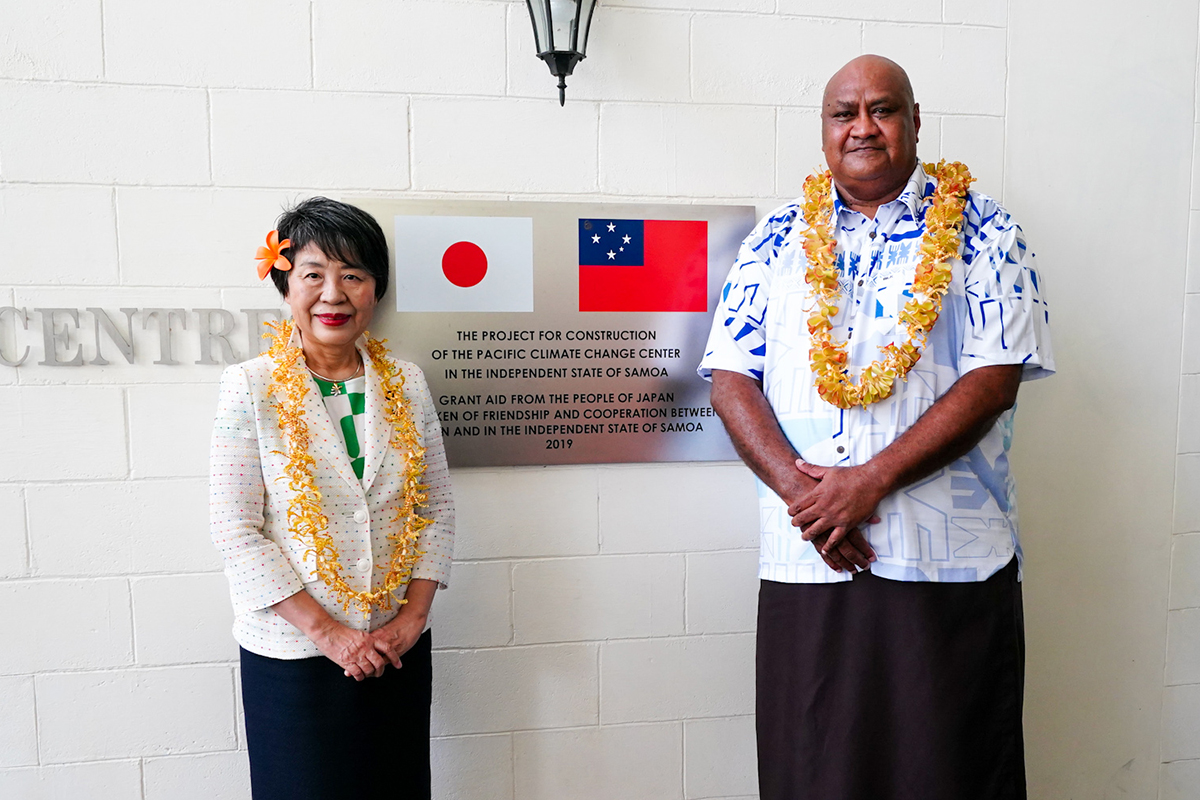
This page is sponsored by the government of Japan.
